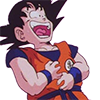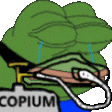"Mihawk is only the strongest pure swordsman", "Anybody who fights with a sword is a swordsman", "Shanks isn't only a swordsman", blah, blah, blah.
One of One Piece's oldest yet arguably most pointless debates; oldest because every week we have new threads on this topic and pointless because Oda himself hasn't been clear at all on this topic —something both sides dishonestly ignore. So in order to bring some foundation to future debates I've been doing some digging and compilated pretty much every canon information I could think of about swordsmanship in this story.
Use it as you wish and discuss whatever you want; that said:
TO BE CONTINUED AFTER THE TIMESKIP.
So far, overall conclusions:
1) Zoro dreams of becoming the strongest dai kengou, not simply the strongest swordsman. There are swordsmen that are stronger than known dai kengous yet don't have the title, and Zoro himself only achieved it after Wano (we will get there in my following of this thread), so Zoro's title can't be just about becoming the strongest sword user overall.
2) The manga has given canon distinctions between real and "fake" swords and swordsmen: a sword without subtlety and that can't choose what to cut isn't a real sword for Mihawk and Koushiro; and to be considered a true swordsman there's something in your attitude, spirit, mind, whatever that Ipponmatsu noticed in Zoro and Zoro noticed in Ryuma.
3) Haki is fundamental to become the Strongest Swordsman since (we'll go deeper into this) Hyogoro described haki the same way Koushiro described the breath of things, Mihawk took Zoro into consideration only after noticing his strong spirit and these two's training included learning busoshoku.
4) There's a way of the sword and a code for swordsmen that seems to be very important for both Zoro and Mihawk.
5) Swords are seen in animistic terms by Oda, something that will be heavily explored in Wano (but we will get there).
Thanks for reading and stay tunned for the rest!
One of One Piece's oldest yet arguably most pointless debates; oldest because every week we have new threads on this topic and pointless because Oda himself hasn't been clear at all on this topic —something both sides dishonestly ignore. So in order to bring some foundation to future debates I've been doing some digging and compilated pretty much every canon information I could think of about swordsmanship in this story.
Use it as you wish and discuss whatever you want; that said:
Inference: developing a style makes you stronger by itself, so there's a technique dimension related to your overall strength as a swordsman.


Inference: a fighter who uses a sword with no subtlelty nor skill can't even call his weapon a sword.




Inference: this either means that the more skilled you are the easier you notice who is a weaker swordsman than you or may be a hint at observation being important for a swordsman as it allows to measure your adversary's strength.


Inference: skill is undeniably important for every powerful swordsman and so far is defining the top at the field instead of just individual strength.


Inference: first explicit mention to physical strength playing a role at becoming the World's Strongest Swordsman instead of only skill and technique, although Zoro denies it since he believes Kuina could keep it up in the future.


Inference: to be considered a swordsman (and potentially enter the race for the title of Word's Strongest) you need to follow a code that defines the philosophy of what a swordsman is; such ideals will be referred throughout the story, starting by Zoro in this very chapter as he rejects giving his back to Mihawk.


This is brought back again in chapter 195:



This is brought back again in chapter 195:

Inference: once again, skill is depicted as foundamental for Mihawk to judge the strength of a swordsman. He isn't focusing on anything else.


Inference: spirit is will, will is haki; only a person with very powerful haki can truly take Mihawk's spot and odds are haoshoku, as the embodiment of such kingly ambitions, is also important to truly become the Strongest Swordsman.


Inference: the swords seller in Loguetown looks into the eyes of a real swordsman after a very long time when he meets Zoro; this hints to a canon distinction between the average sword carrier and "real swordsmen" (and I don't think a "fake swordsman" could ever become the Strongest). This distinction seems to be related to how swords choose their wielders; this animism will be brought back again through the story.

In fact, in this same chapter we have Tashigi saying the swords wielded by criminals must be crying, once again hinting at them having some life inside:


In fact, in this same chapter we have Tashigi saying the swords wielded by criminals must be crying, once again hinting at them having some life inside:

Inference: while this is a reach because the story wasn't properly established yet, this statement potentially excludes people like Aokiji and Kizaru as swordsmen no matter they use elemental swords to fight (and they'd obviously be famous as admirals).


Inference: skill is fundamental to become a stronger swordsman. Tashigi, unlike Kuina, doesn't believe her physical weakness will be an obstacle.


Now this is a very important detail that is often missed by fans who rely on translations. There's a canon distinction between swordsmen, no matter their strength, and dai kengou (大剣豪 ); @[No Name] made a very good thread on this issue that you can read here:
https://worstgen.alwaysdata.net/for...-about-swordsmanship-skills-and-titles.31333/
I won't be repeating what he already posted back then, but to summarize:
In chapter 100 Zoro states his dream is to become the strongest dai kengou, not strongest swordsman; this is arguably the reason why some translations followed the "World's Greatest Swordsman" alternative since, as [No Name] shared, a dai kengou isn't necessarily stronger than a non-dai kengou: Shanks, Roger, Rayleigh, Big Mom... are obviously stronger than the likes of Vista, Ushimaru and current Zoro, yet unlike them they are never treated as 大剣豪.
Inference: a non-dai kengou can't claim the World's Strongest Swordsman title no matter their actual strength. Whatever distinguishes a dai kengou from a swordsman is also connected to the title of "World's Strongest Dai Kengou" that Zoro seeks.

https://worstgen.alwaysdata.net/for...-about-swordsmanship-skills-and-titles.31333/
I won't be repeating what he already posted back then, but to summarize:
In chapter 100 Zoro states his dream is to become the strongest dai kengou, not strongest swordsman; this is arguably the reason why some translations followed the "World's Greatest Swordsman" alternative since, as [No Name] shared, a dai kengou isn't necessarily stronger than a non-dai kengou: Shanks, Roger, Rayleigh, Big Mom... are obviously stronger than the likes of Vista, Ushimaru and current Zoro, yet unlike them they are never treated as 大剣豪.
Inference: a non-dai kengou can't claim the World's Strongest Swordsman title no matter their actual strength. Whatever distinguishes a dai kengou from a swordsman is also connected to the title of "World's Strongest Dai Kengou" that Zoro seeks.

Inference: only a sword that chooses what to cut is a real sword. This was first related to the breath of things as a skill or technique, but later retconned to haki; we will reach there, but considering this, haki is stressed as a defining trait of real swordsmen as only through it can they use real swords.


Inference: swordsmanship isn't just about fighting with a blade.




Inference: something called "the way of the sword" is brought up; it's a very important concept because Zoro doesn't understand it properly and mistakes "to push and keep pushing" with it. This is later proven wrong since pushing and pushing against Bonez was pointless and only after awakening the skill to cut steel can he defeat him with one focused slash instead of his usual pushing of unskilled cuts.


Inference: it's not enough with skill alone since Ryuma has Brook's skills but a physically stronger body that is what makes him more powerful than our skeleton. So you can't become the strongest swordsman with skill only.


Brook even notices in chapter 466 that Ryuma wasn't going all out against him, further increasing the power gap:



Brook even notices in chapter 466 that Ryuma wasn't going all out against him, further increasing the power gap:

Inference: once again, a canon distinction for "true swordsmen" is established. In this case, to be a true swordsman you need to have an adequate body but also an adequate mind likely related to the way of swordsmanship and its code.




Inference: another reference to swords being somewhat alive and choosing their users. This is a consistent theme throughout the story and, in my opinion, fundamental to understanding swordsmanship since, according to Koushiro, the pinnacle of swordsmanship is freely cutting what to cut and what not to cut —and to do so you need to fully merge your will with your sword, which will be further mentioned.


Inference: there are skills required to become the Strongest which Zoro wants Mihawk to teach him about. Later in Dressrosa we have a flashback of Mihawk teaching Zoro armament haki, stressing it as important to defeat him.




TO BE CONTINUED AFTER THE TIMESKIP.
So far, overall conclusions:
1) Zoro dreams of becoming the strongest dai kengou, not simply the strongest swordsman. There are swordsmen that are stronger than known dai kengous yet don't have the title, and Zoro himself only achieved it after Wano (we will get there in my following of this thread), so Zoro's title can't be just about becoming the strongest sword user overall.
2) The manga has given canon distinctions between real and "fake" swords and swordsmen: a sword without subtlety and that can't choose what to cut isn't a real sword for Mihawk and Koushiro; and to be considered a true swordsman there's something in your attitude, spirit, mind, whatever that Ipponmatsu noticed in Zoro and Zoro noticed in Ryuma.
3) Haki is fundamental to become the Strongest Swordsman since (we'll go deeper into this) Hyogoro described haki the same way Koushiro described the breath of things, Mihawk took Zoro into consideration only after noticing his strong spirit and these two's training included learning busoshoku.
4) There's a way of the sword and a code for swordsmen that seems to be very important for both Zoro and Mihawk.
5) Swords are seen in animistic terms by Oda, something that will be heavily explored in Wano (but we will get there).
Thanks for reading and stay tunned for the rest!
Last edited:










